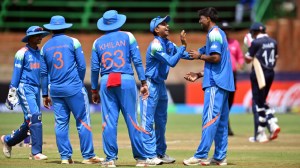Inside track
Growing authorityWhen the unknown MP from Andhra Pradesh G.M.C. Balayogi took over as Speaker of the Lok Sabha he was the butt of jokes be...

Growing authority
When the unknown MP from Andhra Pradesh G.M.C. Balayogi took over as Speaker of the Lok Sabha he was the butt of jokes because of his inexperience. Balayogi had a tough time trying to control the unruly House, his diffident refrain 8220;bethoji8221;sit down, sir evoked little response from MPs. But this year Balayogi speaks with new-found authority and confidence. Last week, when Congress deputy leader Madhavrao Scindia protested against the Speaker8217;s ruling, Balayogi ticked him off for daring to question the Chair and warned that if he had been a junior member he would have ordered his removal from the House.
While still not fully conversant with the rule book, Balayogi manages with the help of typed notes prepared by his secretarial staff. He has also taken lessons in Hindi diction from Ratnakar Pandey8217;s brother.
Changing his tune
Law Minister Ram Jethmalani constantly raises the bogey of a Judicial Commission to be made the final arbiter on senior judicialappointments. It seems that the one-time champion of freeing the judiciary from political interference has changed his tune on becoming the Law Minister. He now wants a say in the selections to the judiciary. To make out a case for reform in the procedure for appointment of judges, Jethmalani has been citing the long delays in filling vacancies in the high courts and the apex court. At the beginning of December, there were 154 vacancies out of an approved strength of 618 judges throughout India.
While the large number of vacancies does reflect poorly on the judiciary8217;s efficiency, surely the Law Ministry is also partly responsible for the delay. The ministry is sitting over some 30 judicial appointments recommended by high court chief justices.
Scandal-snuffing
Their victims include some of the Who8217;s Who of Delhi. So why is the media, the law, and the political world soft peddling the scandal? In contrast to the screaming headlines in the Romesh Sharma scam, there is a general reluctance tofocus on the alleged extortion racket involving Abhishek Verma and Ashok Aggarwal.
The Government should explain just how Aggarwal got away for so many years though his dubious reputation was widely known. There were corruption cases instituted against Aggarwal even when he was an income tax officer, but they were conveniently dropped after he became the private secretary to Minister of Mines, Balram Singh Yadav in the Rao government. Last year, the Central Vigilance Commission directed that the former deputy director in the Enforcement Department be posted out of Delhi. But Aggarwal stayed put in the Capital as a deputy secretary in the Department of Revenue. The CBI sat on the the CVC recommendation for an inquiry against the former deputy director of the ED for four months before his premises were finally raided. Aggarwal by then had naturally sanitised his house and office.
Aggarwal and Verma8217;s strength is cultivating important people in the media, business, government and politics. And a lot ofpowerful people are now anxious to keep the spotlight away from themselves in case there is a genuine investigation. Already V. George has got singed by the scandal since Verma8217;s interrogation has brought out that Sonia Gandhi8217;s private secretary has accumulated embarrassingly large assets which have obviously not come from his modest secretarial salary.
Mischievous memoirs
The memoirs of the colourful dancer Protima Bedi who died two years ago in a landslide are being released shortly. Timepass based on the candid confessions of her diaries compiled by her daughter Puja Bedi has not shied away from mentioning the names of her many lovers from Rajni Patel to Pandit Jasraj. The exception is the former Congress minister from Delhi who is referred to simply as Manu8217;. But there are enough clues to speculate on the identity of the politician whose help Bedi sought in trying to get a government bungalow in Delhi under the dancers8217; quota.
No return policy
Jesudas Seelam, a Karnataka cadreIAS officer, resigned on the eve of the last parliamentary elections to contest the Bapatla, constituency in Andhra Pradesh on a Congress ticket. Seelam was defeated and he now wants his IAS job back. Karnataka Chief Minister S.M. Krishna is inclined to reinstate him too, but the Ministry of Personnel and the PMO are not as accommodating, particularly as more than three months have lapsed since he put in his papers. Seelam has not, however, given up his efforts to get back his job.
- 01
- 02
- 03
- 04
- 05































